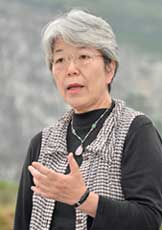Etsuko Abe to raise awareness nationwide of soil issues related to Henoko landfill

Etsuko Abe, co-representative of the nationwide organization Opposition to Henoko Soil Hauling.
September 2, 2015 Ryukyu Shimpo
On September 3 at 6:30 p.m. at Mizu Plaza in Omoromachi, Naha, Etsuko Abe, an interim co-representative of the nationwide liaison council Opposition to Henoko Soil Hauling and co-representative of the Pan-Seto Inland Sea Congress, opened a meeting of the aforementioned liaison council. This council was established by a Naha citizens’ group performing activities at the excavation sites for soil to be used for the building of the replacement facility in Henoko. Abe says she will endeavor to collect signatures for a petition against soil hauling, and spread information about Henoko’s soil issues around Japan.
The nationwide liaison council established on May 31 has grown from a composite of 7 smaller organizations to a composite of 8. Additionally, Fukuoka and Kumamoto Prefectures both launched regional liaison councils, and there are citizens’ movements in Nagasaki and Kagawa Prefectures. Abe says approval of these activities is increasing. She says she wants to hear from people in Okinawa and keep an eye on the Diet proceedings as she prepares to submit the 43,000 signatures she has collected.
After inspecting each of the intended soil excavation sites, Abe emphasizes that although the dirt is being removed from unseen places, such as mountains, those places are essential to the people who live there. Furthermore, she points out that post-excavation, there is also the issue of industrial waste being buried at these sites. Common impressions within the opposition movement are that it is time for local people affected by Henoko issues to have another chance at receiving recognition, and that everyone desperately wants to avoid seeing their hometowns damaged.
Abe states that excavation in Goto City, Nagasaki Prefecture, and SDF force deployment problems in Amami Oshima, Kagoshima Prefecture, are related to Okinawa’s anti-war sentiment and the Henoko base. People living near soil excavation sites are made to be both aggressors and victims in these situations, she says, and all these issues are also related to nuclear power and the national government’s new security bills. She says she hopes to learn about Okinawa’s position from Okinawans. Then she plans to bring what she learns in Okinawa back to the people of the Seto Inland Sea region.
(Translation by T&CT and Erin Jones)
Previous Article:3,800 protesters against new US base and new security laws gather in front of Camp Schwab
Next Article:Immediately after Onaga inauguration, SDF Chief of Joint Staff Council “promised” Henoko to the US
[Similar Articles]
- Group opposing Henoko Soil Hauling discusses future activities
- Representatives from soil source sites for land reclamation assert solidarity with Okinawa opposing Henoko construction
- Nationwide liaison council opposing Henoko soil hauling calls for measures against invasive species
- Rally at Kantei protests soil deposits, requests no stay be used against Onaga’s revocation
- Opposition to Henoko Soil Hauling advises extending scope of invasive species prevention
 Webcam(Kokusai Street)
Webcam(Kokusai Street)


